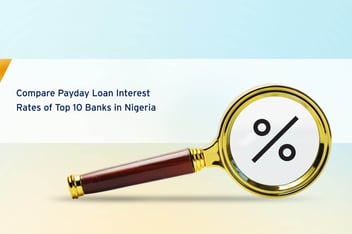
Lending Terms Business Owners Should Know in Nigeria
Author Taiwo Temitope-Adesope
Small business owners in Nigeria often require loans to fund their business operations, but the lending process can be overwhelming and confusing. Business owners may encounter unfamiliar lending terms and jargon when dealing with lenders, making it difficult to understand the loan application process. To make informed decisions about borrowing, it is essential for business owners to be familiar with lending terms and their meanings.

There are various lending terms that business owners in Nigeria should know. Understanding these terms can help business owners select the best loan options for their needs. For instance, knowing the difference between secured and unsecured loans can help business owners choose the best loan option for their business.
A secured loan requires collateral, such as a business asset, while an unsecured loan does not require collateral. Business owners should also be familiar with terms such as interest rate, repayment term, and loan origination fee, among others.
Understanding the Lending Landscape in Nigeria
Nigeria's lending landscape has evolved significantly over the years, with the traditional system giving way to a more flexible, digitally enabled system that offers faster and more convenient lending processes. Business owners looking to obtain financing must understand the key financial institutions and regulatory framework that govern lending in Nigeria.
Key Financial Institutions and Their Roles
The Central Bank of Nigeria (CBN) is the apex regulatory body for all financial institutions in Nigeria. The CBN regulates and supervises banks, microfinance banks, and other non-bank financial institutions. It also sets the guidelines and policies that regulate lending in Nigeria.
Commercial banks are some of the primary lending institutions in Nigeria. They offer different types of loans, including personal loans, business loans, and mortgages. Business owners can obtain loans from commercial banks by meeting the banks' requirements for loan eligibility.
Microfinance banks (MFBs) are another critical player in Nigeria's lending landscape. MFBs provide microcredit and other financial services to small and medium-sized enterprises (SMEs) and low-income earners. They offer loans to business owners who may not meet the requirements of commercial banks.
Regulatory Framework and Compliance
The regulatory framework for lending in Nigeria is robust, and business owners must comply with the regulations to obtain financing. The CBN sets the guidelines and policies that govern lending in Nigeria. It also regulates and supervises all financial institutions in the country.
To obtain financing in Nigeria, business owners must register their businesses with the Corporate Affairs Commission (CAC). The CAC is responsible for the registration and regulation of all companies in Nigeria. The registration process involves providing the necessary documentation and paying the required fees.
Business owners must also comply with the lending regulations set by the CBN. The regulations cover issues such as loan pricing, collateral requirements, and loan classification. Business owners must ensure that they understand and comply with these regulations to avoid penalties and other negative consequences.
In conclusion, the lending landscape in Nigeria is complex, and business owners must understand the key financial institutions, regulatory framework, and compliance requirements to obtain financing. By doing so, they can access the funding they need to grow their businesses and achieve their goals.
Essential Lending Terms for Nigerian Business Owners
Nigerian business owners need to understand various lending terms to make informed decisions when borrowing money. Below are some essential lending terms Nigerian business owners should know.
Principal Interest
The principal is the amount of money borrowed, while interest is the cost of borrowing the money. The interest rate is usually expressed as a percentage of the principal. The interest rate can be fixed or variable.
APR (Annual Percentage Rate)
The annual percentage rate (APR) is the total cost of borrowing money, including fees and interest, expressed as a percentage of the loan amount. It is a standard measure used to compare the cost of loans from different lenders.
Secured loans
A secured loan is a loan that is backed by collateral, such as property or equipment. If the borrower defaults on the loan, the lender can seize the collateral to recover their losses.
Unsecured loans
An unsecured loan is a loan that is not backed by collateral. These loans are riskier for lenders, so they usually have higher interest rates.
Fixed interest rates
A fixed interest rate is an interest rate that does not change over the life of the loan. This makes it easier for borrowers to budget and plan for loan payments.
Variable interest rates
A variable interest rate is an interest rate that can change over the life of the loan. These rates are usually tied to an index, such as the prime rate.
Term loans
A term loan is a loan that is repaid over a set period, usually with fixed payments.
Lines of credit
A line of credit is a flexible loan that allows borrowers to borrow money up to a certain limit. Borrowers can withdraw and repay funds as needed.
Balloon payments
A balloon payment is a large payment due at the end of a loan term. These payments can be risky for borrowers who may not have the funds to make the payment.
Prepayment penalties
A prepayment penalty is a fee charged by lenders if borrowers pay off their loans early. These fees can be significant, so borrowers should be aware of them before taking out a loan.
Origination fees
An origination fee is a fee charged by lenders for processing a loan application. These fees can vary widely, so borrowers should compare fees from different lenders.
Late fees
Late fees are fees charged by lenders if borrowers miss loan payments. These fees can add up quickly, so borrowers should make every effort to make payments on time.
Closing costs
Closing costs are fees charged by lenders and other parties involved in the loan process. These fees can include appraisal fees, title fees, and legal fees.
Covenant
A covenant is a condition of a loan agreement that borrowers must meet. These conditions can include financial ratios, limits on dividends, and restrictions on asset sales.
Default
This occurs when borrowers fail to make loan payments as agreed. Default can have serious consequences, including damage to credit scores and legal action by lenders.
Personal guarantee
A personal guarantee is a promise by a borrower to repay a loan if the business is unable to do so. Personal guarantees can be risky for business owners, as they put personal assets at risk.
Loan-to-value ratio (LTV)
The loan-to-value ratio is the ratio of the loan amount to the value of the collateral. Lenders use this ratio to assess the risk of a loan and determine the amount they are willing to lend.
Understanding Loan Agreements
When it comes to obtaining a business loan, it is essential that business owners take the time to carefully read and understand the loan agreement before signing it. A loan agreement is a legally binding document that outlines the terms and conditions of the loan, including the repayment schedule, interest rate, and any collateral or guarantees required. This section will cover the importance of carefully reading and understanding loan documents, tips for negotiating loan terms with lenders, and red flags to watch out for in loan agreements.
Importance of carefully reading and understanding loan documents
A loan agreement is a legally binding document, and business owners must understand all of the terms and conditions outlined in the agreement before signing it. Failure to do so could result in serious consequences, including defaulting on the loan and damaging the business's creditworthiness. Therefore, business owners should take the time to read and understand all of the terms and conditions of the loan agreement, including the repayment schedule, interest rate, and any collateral or guarantees required.
Tips for negotiating loan terms with lenders.
Before signing a loan agreement, business owners should negotiate with the lender to ensure that the terms and conditions of the loan are favourable. Some tips for negotiating loan terms include:
- Shop around for the best loan terms and interest rates.
- Ask the lender to waive any fees or charges.
- Negotiate a longer repayment period to reduce the monthly payment amount.
- Ask for a lower interest rate or a fixed interest rate to avoid fluctuations in the monthly payment amount.
Red flags to watch out for in loan agreements.
Business owners should also be aware of red flags in loan agreements that could indicate unfavourable terms or potential risks. Some red flags to watch out for in loan agreements include:
- High-interest rates or fees.
- Prepayment penalties penalize the borrower for paying off the loan early.
- Variable interest rates that can fluctuate over time.
- Collateral requirements that put the business's assets at risk.
- Personal guarantees hold the business owner personally liable for the loan.
In conclusion, business owners should carefully read and understand all of the terms and conditions of a loan agreement before signing it. They should also negotiate with the lender to ensure favorable terms and watch out for red flags that could indicate potential risks or unfavorable terms. By doing so, business owners can ensure that they are making informed decisions about their business's capital and cash flow.
Conclusion
In conclusion, understanding lending terms is crucial for business owners who are planning to apply for a loan in Nigeria. By knowing the terms and conditions of a loan, business owners can make informed decisions and avoid falling into debt traps.
Some of the key takeaways for preparing for a business loan application in Nigeria include understanding the different types of loans available, such as secured and unsecured loans, and the requirements for each. Additionally, business owners should be aware of the interest rates and fees associated with each loan, as well as the repayment terms and consequences of defaulting on a loan.
To encourage informed decision-making and responsible borrowing practices, business owners need to do their research and shop around for the best loan options. They should also ensure that they have a solid business plan and financial projections in place before applying for a loan.
By following these guidelines, business owners can increase their chances of securing a loan that is right for their business and avoid unnecessary financial stress.
Want more content like this? Sign up on nairaCompare!
About Author

Taiwo Temitope-Adesope
Taiwo is a passionate storyteller and strategist dedicated to empowering women and crafting compelling narratives. A First-Class graduate in Mass Communication from Covenant University, she specializes in writing, public relations, and digital marketing. As a Content Manager at Suretree, she drove a 50% increase in web traffic through SEO and boosted website engagement by 60% in just four months. Her leadership experience includes serving as Public Relations Officer for the Covenant University Student Council and contributing to impactful volunteer initiatives. With expertise in strategic thinking and business acumen, Taiwo continues to create stories that inspire confidence and imagination.
.png?width=1615&height=444&name=nairaCompare%20Christmas%20logo%20(PNG).png)








